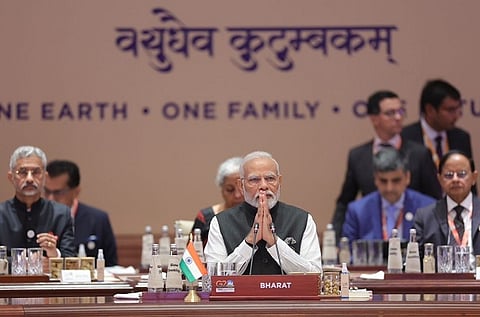
- News Updates
- PSU Watch
- Defence News
- Policy Watch
- हिन्दी न्यूज़
- Jobs Watch
- States News
- Event News

Stating that rising commodity prices are contributing to cost of living pressures, the G20 leaders on Saturday committed to facilitate "open, fair, predictable, and rules-based" trade in agriculture, food and fertilisers and not impose export curbs in line with relevant WTO rules.
Adopting the New Delhi Declaration of G20 countries here, the member countries also committed to support developing countries' efforts and capacities to address their food security challenges.
They committed to work together to enable access to affordable, safe, nutritious and healthy diets, and to foster the progressive realisation of the right to adequate food.
"We commit to enhance global food security and nutrition for all in line with the G20 Deccan High-Level Principles on Food Security and Nutrition 2023," the Declaration said.
To achieve this, the member countries committed to six high-level principles, including facilitating open and free trade in food and fertilisers.
"Commit to facilitate open, fair, predictable, and rules-based agriculture, food and fertilizer trade, not impose export prohibitions or restrictions and reduce market distortions, in accordance with relevant WTO rules," it said.
It may be noted that India has banned the export of wheat and some varieties of rice in order to control food inflation.
Besides free trade, the G20 leaders committed to track two more commodities, fertiliser and vegetable oils, under the Agricultural Market Information System (AMIS) and the Group on Earth Observations Global Agricultural Monitoring (GEOGLAM) for greater transparency to avoid food price volatility.
They decided to support AMIS' work on fertilisers, its expansion to include vegetable oils, and for enhancing collaboration with early warning systems, the Declaration said.
AMIS, which currently tracks four crops -- rice, wheat, corn and soya, collects data from various member countries and generates outlook models and price forecasts. It is for the first time, that AMIS will track crop input fertiliser in view of recent volatility in global prices.
The Declaration also emphasised the importance of increasing access to the availability, and efficient use of fertiliser and agricultural inputs, including through strengthening local fertiliser production and improving soil health.
Welcoming the outcomes from the G20 members engagement in the 12th G20 Meeting of Agriculture Chief Scientists (MACS), the member countries agreed to encourage efforts to strengthen research cooperation on climate-resilient and nutritious grains, such as millets, quinoa, sorghum and other traditional crops, including rice, wheat and maize.
They committed to accelerating innovations and investment focused on increasing agricultural productivity, reducing food loss and waste across the value chain, and improving marketing and storage, to build more sustainable and climate-resilient agriculture and food systems, according to the Declaration.
Further, the G20 leaders observed that while global food and energy prices have fallen from their peak levels, the potential for high levels of volatility in food and energy markets remains, given the uncertainties in the global economy.
In this context, they also took note of the G20 Report on Macroeconomic
Impacts of Food and Energy Insecurity and their Implications for the Global Economy.
"We look forward to an ambitious replenishment of the International Fund for Agricultural Development (IFAD) resources at the end of the year by IFAD members to support IFAD's fight against food insecurity," the Declaration said.
Emphasising securing women's food security, nutrition and well-being, the declaration said, "We will encourage investments in inclusive, sustainable and resilient agriculture and food systems. Support accessible, affordable, safe and nutritious food and healthy diets in school meal programmes".
They agreed to promote innovation for inclusive agri-value chains and systems by and for women farmers besides supporting gender-responsive and age-sensitive nutrition and food system interventions by leveraging innovative financing instruments and social protection systems in ending hunger and malnutrition, it said.
Women's food security and nutrition is the cornerstone of individual and community development as it lays the foundation for women's health, as well as that of her children, family and the general well-being of the community, it added.
(PSU Watch– India's Business News centre that places the spotlight on PSUs, Bureaucracy, Defence and Public Policy is now on Google News. Click here to follow. Also, join PSU Watch Channel in your Telegram. You may also follow us on Twitter here and stay updated.)
